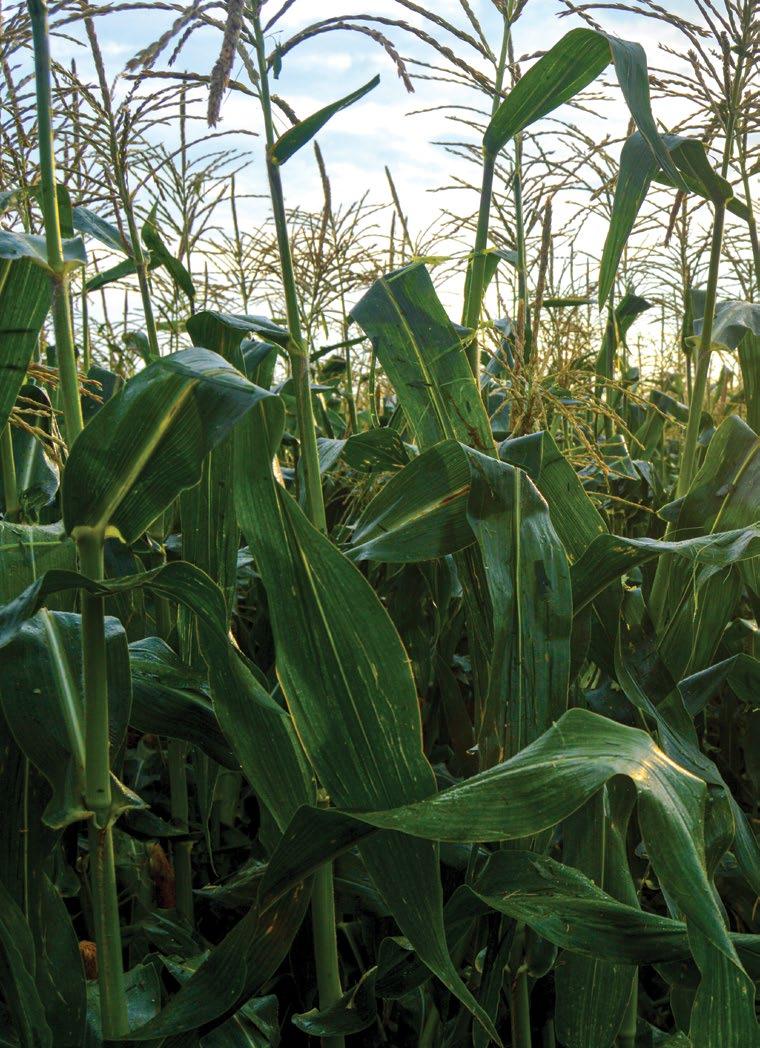
10 minute read
The Century Farm Program
from Arkansas Grown
Years bring new perspective to Century Farm honoree
At 82, Alma Ahrent Powell has a vastly different opinion of her family’s Clay County farm than she did at 18. “I always said, ‘If I ever get out of this cotton patch, I’m not going to look back,’” she said, even as she shuffled through documents and financial statements chronicling the land’s 111-year history. With the renewed perspective of adulthood and a firm commitment to keeping the family farm alive, Powell chose to participate in the Arkansas Century Farm Program. The program administered by the Arkansas Department of Agriculture honors farm properties in the state that have been owned by the same family for more than 100 years. The Ahrent farm near Corning was established by Powell’s grandfather in 1909. “When I think about it now, it was a wonderful life and a wonderful childhood,” Powell said. “At the time, you just didn’t realize how wonderful it was. Everybody worked hard.” The Ahrent farm was established by Powell’s grandfather, William, the son of a German immigrant who moved to Batesville from southern Indiana in 1908. A year later, he relocated to Clay County. In the summer of 1927, Powell’s grandfather was kicked by a horse and suffered a fractured leg. He later suffered complications and was transported by train to a hospital in St. Louis where he died on October 21, 1927. William Ahrent’s son, Edward “Eddie” Ahrent, and his wife, Ellereda Deterding Ahrent, tended the farm for decades. They raised five children there, including Powell. The old farmhouse remains on the property and the land is rented to farmers who grow rice and soybeans on the 240-acre tract.
Advertisement
“It’s just precious,” said Powell, who lives in nearby Poplar Bluff, Missouri. “Of course, we go back and forth still. There is an old pecan tree that’s more than 100 years old, and I’ll go down and pick pecans.” Though none of the Ahrent family lives or works on the farm anymore, Powell said there’s been no talk of selling the land. “It’s our memories. The children spent happy summers there,” she said. “Most all of them are professionals. The oldest grandchild will be 60 this year, but the memories of that farm and their grandparents are profound for them. It’s very special.” Powell said she learned about the Arkansas Century Farm Program from her daughter, who encouraged her to apply for the recognition. To honor the state’s rich agricultural heritage, each family participating in the program receives a certificate and a personalized metal sign to identify their farm as an Arkansas Century Farm. To qualify, the legal owner or owners of the property must submit an application. The farm must have been owned by the same family for at least 100 years, and the land must include at least 10 acres of the original farm and make a financial contribution to the overall farm income. “When I think about it now, it was a wonderful life and a wonderful childhood.”

Applicants must provide legal documentation showing at least a century of continuous farm ownership, and the process is free to the applicant. Farm owners interested in applying for the Century Farm program should visit agriculture.arkansas.gov/arkansas-centuryfarm-program.
Powell said four of the heirs to the Ahrent farm are still living, including her, two brothers, and a sister. Many other members of the Ahrent family remained in Corning, including the current mayor of the town. Other direct descendants of her grandfather, William, are Clay County farmers. Powell’s cousins, Mark and Michael Ahrent and their families, were the 2018 Northeast District Farm Family of the Year.

Powell said she enjoyed looking back on the history of her family’s farm as she moved forward in the Arkansas Century Farm process. Powell, who’s spent a career in the medical field, said she’s amazed at the changes in her industry and in agriculture as well. Though she didn’t have much use for the cotton farm growing up, she still reminisces about it and thinks others are missing out on the experience.


The Arkansas Century Farm Program recognizes Arkansas farm families who have owned and operated an area of 10 acres or more for a least 100 years. The Arkansas Department of Agriculture began the Century Farm program in 2012 as a way to highlight the impact of these families on the agriculture industry as well as their overall contributions to our state.
Number of Century Farms by Region
Since the program began, 464 farms have been inducted. In 2019 alone, 46 farms were inducted.
464 FARMS
46 IN 2019
NORTHWEST 97
NORTH CENTRAL 59
CENTRAL 95
SOUTHWEST 52
LOWER DELTA 78
UPPER DELTA 83
The Arkansas Century Farm program is open for applications each year from February until May. To get more information about applying, visit: agriculture.arkansas.gov/arkansascentury-farm-program.
Congratulations to the 2019 Century Farm inductees!
Arch Westmoreland Farm Beard Family Farm Beaty Old Homeplace Bob & Sue Austin Farm Chambers Farm Chronister Family Farm Churchill Holler Farm Crigger Farm Curtis Farm Dickson Farm Donovan Farm E.M. Brown Farm Edward “Eddie” Ahrent Farm F. H. Lyons Farm Flynn Farms Grinder/Taylor Farm H & D Tucker Farms Henry Jones Family Farm Henry-Franklin Farm Highfill Family Farm Hoover Family Farm Humphries Hubble Creek Farm James B. Whitlow Farm JK-M&M Ranch Johns Family Farm Locke Farm Louis Floyd Farm Mahony Farm Marshall Farm Miller Bros/Flying Farmers Farm Morris-Taylor Family Farm Ragsdell Family Farm Rauls Family Farm Reding Farm Ryland Family Farm Sehorn Farms Sharp County Farm Sickel Farms Simmons Family Farm Sitzer Farm Sugar Creek Farm Troy & Donna Henson,
Gol & Jewell Smith Farm Webb Place Wiles Family Farm Wilks Family Farms York Family Farm

Sweet on the Stalk: Esau’s Sweet Corn
Meticulous Care, Attention to Details Make Esau’s Sweet Corn Unforgettable
It just takes one word – Esau – for the craving to start for delicious, Arkansas-grown sweet corn. “No one ever really adds any other descriptors,” said Chad Esau, whose family raises corn on 160 acres in Desha County. Esau’s humble attempts to claim the corn is no different than anyone else’s is contradicted by the long lines of customers in June and July. “Someone from Guy, Arkansas, or Conway, Arkansas, may put a sign out by the road or say something on Facebook about ‘Taking orders for Esau corn’ and that’s worked out pretty well for us,” said Chad Esau. Chad’s parents, Chester and Carol Esau, founded Esau’s Home-Grown Sweet Corn near Dumas in 1990. Chad Esau took over the business, now known as Esau Farms, LLC in 2010, and has more than 20 employees during peak season from mid-April to July. The Esau family relocated to Desha County, near Dumas, from DeRidder, Louisiana, to take advantage of Arkansas’s fertile soil and ample irrigation. Esau Farms’ patrons firmly believe that Louisiana’s loss is Arkansas’s gain. “We open the phone lines in the middle of May to start taking orders. People will call to schedule a day to pick up corn that works for both of us,” Esau said. “We have to be careful not to overschedule orders. In the airline business, somebody must give up their seat when they overbook. In the sweet corn business, we want everyone to get the corn they order.” They try not to inconvenience their customers, yet sometimes it’s inevitable. Occasionally customers are waiting while corn is picked right off the stalk, processed and bagged. It’s the freshness that makes all the difference. “One of the most important aspects of sweet corn is that it must be fresh to be really good,” the Esaus say on their website, esausweetcorn.com. Esau sells the Triple Sweet variety and has done so for the past three decades. The corn is natural and non-genetically modified. Each bag of corn contains 62 ears. Esau is one of just a few Arkansas sweet corn growers. Most corn farmers in Arkansas are producing field corn, typically used as livestock and poultry feed. The Esaus begin planting corn in early April, phasing their planting in 27 distinct corn patches over the month. The cycled planting and harvesting help ensure that customers receive the freshest corn in their orders. “There are some secrets to the trade that we keep under our hat, but it’s nothing that you can’t figure out,” Esau said. “We order the same seed anybody else does. We just do a meticulous job of raising the corn and paying attention to details. We end up with a good product.” Chad Esau credits his father with establishing the best practices and building a sustainable farm that has a loyal customer base. “We just do a meticulous job of raising the corn and paying attention to details. We end up with a good product.”


The Esaus are adamant about not taking any shortcuts when it comes to growing their corn. That means using mostly organic fertilizers and working hard to keep pests from the crop. By Chad Esau’s standards, even one worm in every 60 ears means the farmers “have somewhat failed in their mission.” Four-legged pests also find Esau’s corn too good to pass up.

In addition to corn, Esau Farms plants a variety of other produce, including watermelons, cantaloupes, muscadines, and blueberries, all available in season. In the fall, Chad Esau and his family raise pumpkins and bundle corn stalks for decorations. After that, it’s ordering seed and bags for next year’s Esau Sweet Corn orders.

For more information about ordering Esau's Triple Sweet Corn and other produce, visit esausweetcorn.com.
Stewardship Economy
Resources

THE voice of forestry. Resources Environment
Economy (501) 374-2441 The Arkansas Forestry Association advocates for the sustainable use and sound stewardship of Arkansas’s forests and related resources to benefit all Arkansans, today and in the future. Stewardship
Benefit The Arkansas Forestry Association advocates for the sustainable use and sound stewardship of Arkansas’ forests and related resources to benefit the state’s forestry community and all Arkansans, today and in the future. Call us: 501-374-2441 Benefit The Arkansas Forestry Association advocates for the sustainable use and sound stewardship of Arkansas’ forests and related resources to benefit the state’s forestry community and all Arkansans, today and in the future. Tree Farm | Project Learning Tree | Landowner Education | Hunting Lease Insurance | Log A Load For Kids Call us: 501-374-2441 Resources Stewardship




Stewardship Tree Farm | Project Learning Tree | Landowner Education | Hunting Lease Insurance | Log A Load For Kids Resources Tree Farm | Project Learning Tree | Landowner Education | Hunting Lease Insurance | Log A Load For Kids
Benefit The Arkansas Forestry Association advocates for the sustainable use and sound stewardship of Arkansas’ forests and related resources to benefit the state’s forestry community and all Arkansans, today and in the future. Tree Farm | Project Learning Tree | Landowner Education | Hunting Lease Insurance | Log A Load For Kids Call us: 501-374-2441 Reducing Accidents Through Enhanced Driver Training & Emphasis on EfFEctive Fleet Management Recruitment of new, Safety-focused drivers to deliver a sustainable and profitable supply chain Introducing ATPA's TEAM Safe Trucking PARTNERSHIP: We're elevating LOG & Fiber TRUCK-DRIVER Safety TEAM SAFE TRUCKING Workshops offered by the Ark Pro Logger Training Program www. arkl og g ers. com 2 0 2 1 AUG 13-14 H o t S p r i n g s










